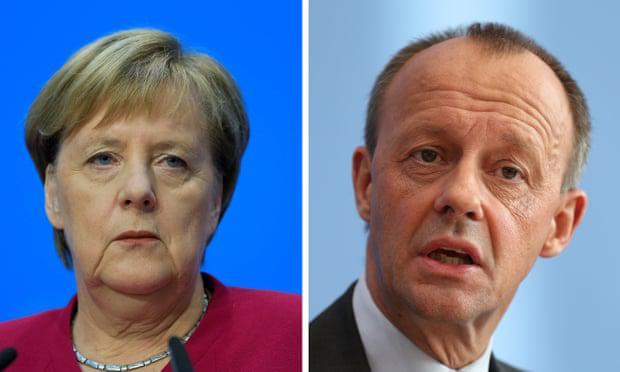Two separate polls have suggested that Friedrich Merz, a rightwinger with a longstanding grudge against Angela Merkel, is emerging as the frontrunner to succeed her as party leader, potentially accelerating her departure as chancellor.
Merkel said on Monday she would stand down in December after 18 years at the helm of the ruling Christian Democratic Union (CDU) and not run again as chancellor in the federal elections due in 2021, unleashing a fierce battle for her succession.
Economically liberal but socially conservative, Merz, one of many once-powerful CDU men to have been outmanoeuvred by Merkel during her long career, threw his hat into the ring straight after her announcement and is widely seen as offering the party a return to its roots after her leftwards push.
He denied on Wednesday that personal tensions would prevent him working with the outgoing chancellor, whom he said he respected but did not always agree with. “I’m convinced that under these changed circumstances, we will get along,” he said.
The party needed “change and renewal, but not revolution”, Merz added, but had to sharpen its profile and present a clearer message. “National identity and traditional values must have have a firm place in our thinking and actions,” he said.
One poll, for Spiegel Online, suggested 34% of voters favoured Merz as party leader, making him clear favourite ahead of the CDU’s secretary general, Annegret Kramp-Karrenbauer, widely regarded as Merkel’s chosen heir, on 19%.
A second poll, for the Handelsblatt daily, gave the corporate lawyer a much narrower lead, with 21% to Kramp-Karrenbauer’s 18%. Both polls put the health minister, Jens Spahn, another fierce Merkel critic and Merz’s chief conservative rival, on just 6%.
CDU party delegates will choose their new leader at a congress in early December, with many observers suggesting that Merkel’s ability to see out the remaining three years of her fourth term as chancellor will depend on their decision.
Commentators suggested Merz’s unlikely comeback – the 62-year-old abandoned politics for business more than a decade ago – has a real chance of succeeding, a likelihood that most believe would see Merkel forced out before her planned exit date.
Paul-Jasper Dittrich of the Jacques Delors Institute in Berlin said that while the upper echelons of the CDU had become much more liberal in Merz’s absence, large parts of the party’s base remained deeply conservative and would be drawn to his candidacy.
“In coming back in from the cold now as a principled ‘outsider’ who hasn’t much changed, Merz will be able to cater for the needs of the base much more authentically than his competitors,” Dittrich said.
That, combined with continued bad polling as the party heads towards its end-of-year congress, could trigger a “revolutionary situation”, he tweeted – meaning Merz’s chances of taking over from Merkel were greater than many had believed.
The Süddeutsche Zeitung daily paper said Merz’s candidacy had “electrified the CDU because in Merz, it is the anti-Merkel reaching out for the seat of party chair”. It added: “His election would be a political turnaround in the party.”
If Merz succeeds, it would be a remarkable return. A talented and provocative former member of the CDU youth wing, he rose to become the party’s parliamentary leader in 2000 but was dislodged by Merkel two years later after the party lost federal elections to Gerhard Schröder’s Social Democrats.
Seeking to consolidate her power base, the future chancellor rallied a majority to oust Merz, whose caustic and often entertaining rhetoric and socially conservative, pro-business views are in marked contrast to her more sober style and social liberalism.
Former colleagues say he has resented her ever since. “This woman should never have been allowed to become chancellor,” he once said privately, according to Der Spiegel. “If I have to blame myself for something, then it would be the failure to have understood her character. She is not capable of loyalty.”
Frustrated, Merz returned to corporate law, leaving the Bundestag altogether in 2009, and in 2016 was appointed head of the supervisory board at the German arm of BlackRock, the world’s largest asset manager.
Unsurprisingly, Merz, a low-tax and light-touch regulation advocate who also holds top supervisory positions at Axa, Deutsche Börse and HSBC, has the support of many in Germany’s business community.
“There is strong backing,” Oskar Niedermayer, a political analyst, told the Rhein-Neckar Zeitung. “His economically liberal, socially conservative positions make him the clear antithesis to Merkel.”
To the German public, Merz is best known for his 2004 demand that German’s hugely complex tax system should be made simple enough for the average family to fill out their tax return on the back of a beermat – and for his contentious appeal for what he called a Leitkultur, or a guiding or dominant national culture.
Long before immigration and integration dominated political debate, Merz insisted anyone wanting to live in Germany should “conform to Germany’s prevailing liberal culture”, sparking a furious national debate in which he was accused of illiberalism and racism.
That record may well prove appealing to a party increasingly alarmed by the way it haemorrhaged votes in last year’s federal election, and in state polls this month in Hesse and Bavaria, to the far-right, anti-immigration AfD.
(THE GUARDIAN)

